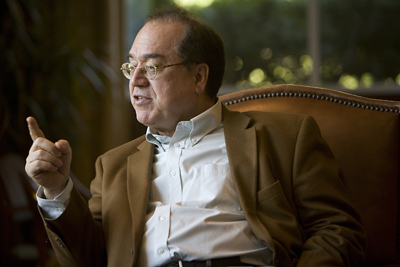Europe's failure to integrate Muslims called a 'recipe for civil war'
By George Lowery

Bassam Tibi knows the obstacles a Muslim faces in Germany, where he has lived for 45 years and has been a citizen for two decades. As an internationally acknowledged expert on Islam, Tibi often appeared in the German media to discuss the Gulf War and was introduced as a Syrian holding a German passport.
But when Tibi raised issues about Western Europe's reception of its 20 million Muslim immigrants, he was suddenly declared persona non grata by the German media, who avoid discussing the status of the nation's Muslims for fear of being perceived as targeting them.
"Ethnically, I'm not German, therefore I'm not German," said Tibi, a Cornell A.D. White Professor-at-Large and director of the Center for International Affairs at the University of Göttingen, in an interview Sept. 18 at the Statler Hotel. "The concept of the person in Germany and France is you are an ethnic person. You never change. The problem is the population in Europe is changing -- 20 percent of the German population is ethnically not German. Within 50 years, non-ethnic Germans will be the majority. If you do not have a solution now, these people will fight against one another, and I don't want that. I want peace."
Tibi believes Muslims fare better in the United States because of the nation's ethnic diversity. "Nobody treats me like an alien [here]," he noted. "I'm an equal, and I want to have this in Europe. Can you imagine someone saying that because you have dark skin you can't be an American?"
European societies offer limited opportunities to Muslim immigrants, even those with citizenship, he said. "In America, if you get citizenship, you're an American. There is a difference in Germany between citizen of the passport and citizen of the heart."
Tibi developed the concept EuroIslam, an interpretation of Europe in Islamic terms. "EuroIslam is not a concept for assimilation; I am against assimilation," he said. "Integration refers to a sense of belonging. I live in Germany, I feel like a German, and I want to be accepted as a German."
The shortcomings are not only with Europeans but also with Muslims who consider themselves members of the transnational Muslim community, taking the attitude that they do not belong to, and therefore have no obligation to, European society. "They themselves create obstacles," Tibi said. "There is a mutual rejection of one another."
Western Europe's Muslim population is expected to reach 50 million by 2035. If formal policies are not enacted, Tibi said, it's "a recipe for civil war." One model he offered was the relative harmony of medieval Islamic Spain, where Jews, Christians and Muslims lived together.
"The idea of Europe, the civilization of Europe, should be the umbrella for Europeans and Muslims to live in peace," he said. "But there must be something Islamic in it."
In Germany, efforts to identify Muslims are seen as "profiling." Tibi sees multiculturalism as the blind acceptance of cultural differences, but "when people from different cultures live together, they must have some commonalities. In pluralism, you put core values above diversity: separation between religion and politics, democracy, individual human rights, tolerance. If someone does not accept the culture of democracy, I can't let that go on in the name of diversity. I do not accept incitement in the name of diversity. Diversity must be conditional on cultural consent to the core values of the societies in which you live. ...
"Europe needs to make provisions so Muslims will be accepted as members of society. But if you want to enter this club, you have to accept these values."
Eventually, Tibi believes, Europe will become Islamic or Islam will become European. "I have a Middle Eastern, Muslim background, and I want to keep it. But I also want to be a European. Islam is possible without Jihad or Sharia [Koranic law]. For me, law is the constitution of the country where I live."
NOTE: Tibi was to have made a speech on campus on Sept. 28 but that event has been canceled.
Media Contact
Get Cornell news delivered right to your inbox.
Subscribe